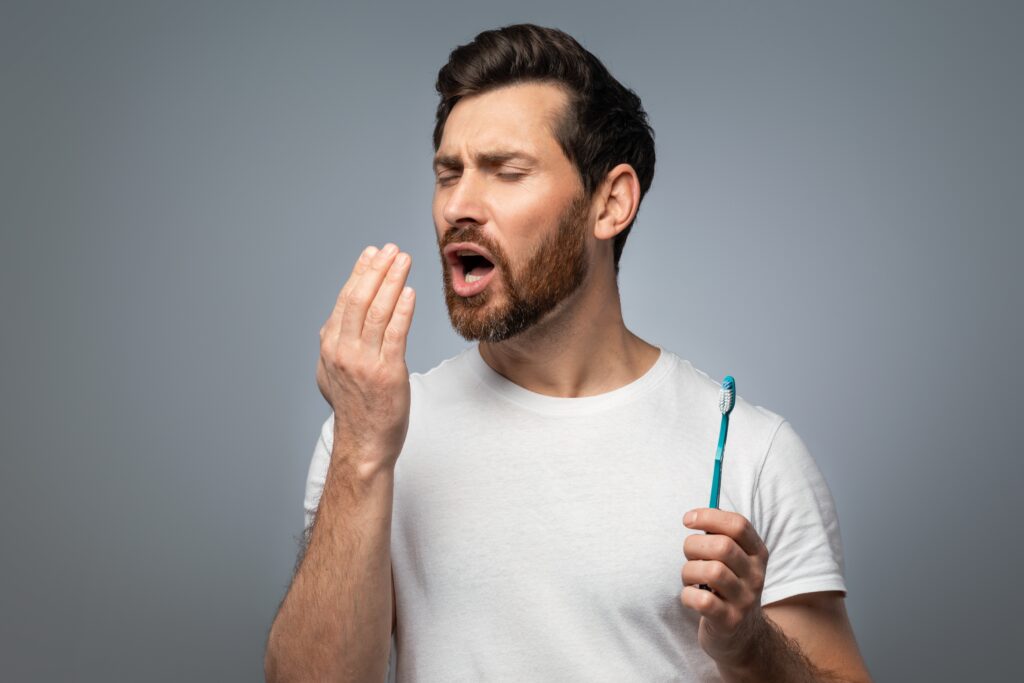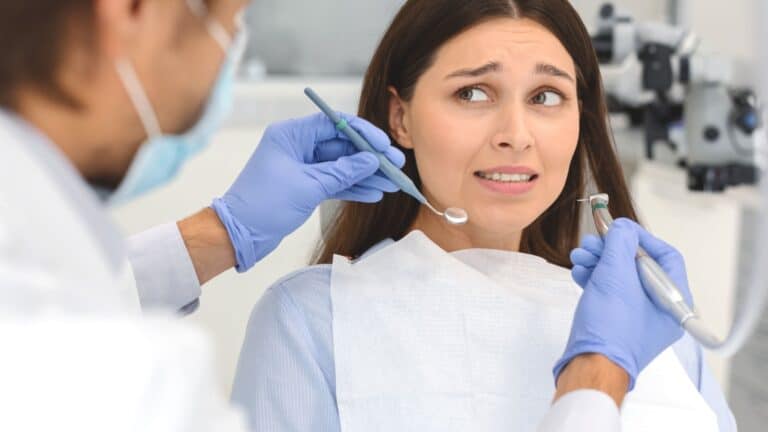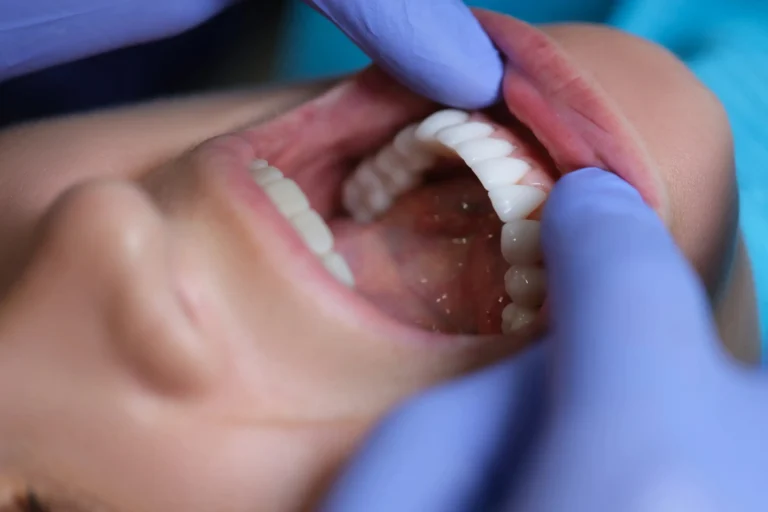
Halitosis, or bad breath, is an embarrassing problem most people face at some point in their lives. You may not even realise you have halitosis until someone points it out. This can leave you feeling self-conscious or anxious around others.
If you’ve got bad breath, you may have tried several remedies to stop unwanted smells, like sucking mints or using breath freshener sprays, but still, the scent creeps through.
Aside from the social unease of knowing you may emit undesirable odours during conversation, your bad breath may indicate a more serious problem.
In this article, we’ll discuss some of the potential causes of halitosis and how we can treat it, along with the ways you can prevent it from remerging.
What Causes Bad Breath?
There are several causes of halitosis, some of which are temporary while others are longer lasting. If you’re worried about recurring bad breath, pay attention to your lifestyle and look for other symptoms. If the problem persists, come and see us for a dental checkup, and we’ll identify the cause.
Food and Drinks
Certain foods and drinks can cause bad breath. Strong-smelling foods like garlic, onions, spices, and dairy can leave lingering odours. If you drink lots of coffee, this can dry your mouth out. When this happens, it creates the perfect conditions for odour-causing bacteria to thrive.
Poor Oral Hygiene
Skipping or skimping on your twice-daily brushing routine can leave you with bad breath.
Thoroughly brushing your teeth in the morning helps get rid of bacteria that’s built up through the night, freshening your morning breath.
By brushing your teeth thoroughly at night, you’ll remove any food debris and plaque that’s built up during the day. This helps reduce bacteria buildup in the night.
Smoking
In addition to leaving the smell of stale smoke on your breath, smoking also dries out your mouth, creating an optimal bacteria breeding environment. Smokers are also prone to developing gum disease, which also often causes bad breath.
Dry Mouth
Saliva helps clear the bacteria that cause bad breath. If you’re not producing enough saliva because you have a dry mouth, this bacteria can build up. Morning breath occurs in part because saliva production decreases while you’re asleep.
Gum Disease
Halitosis is a common side effect of gum disease. As plaque and tartar form around the gum line, it irritates and inflames the gums. Untreated, this progresses, and deep pockets of bacteria form around the roots of your teeth.
Tooth Decay
As plaque breaks down the surface of your teeth, cavities form. Bad breath often comes hand-in-hand with damaged teeth.
Complications Following Dental Treatment
Procedures, like extractions, can leave you with bad breath. If you’ve had a wisdom tooth removed or have had teeth extracted due to infection, a complication called dry socket can cause halitosis. This happens when the site doesn’t clot properly, exposing the nerve.
Other Illnesses
Although the bad breath is noticeable in the mouth, the problem isn’t always dental. Issues with your digestive system, including indigestion and heartburn, kidney problems, liver damage, asthma, cystic fibrosis, sinusitis, and tonsillitis, can all cause halitosis.
Medications
Dry mouth is sometimes a side effect of certain medications. If you take any medications, check the information leaflets provided and speak with your doctor.
How Can You Treat Bad Breath?
The first step in treating bad breath is to identify the cause. During a dental appointment, we’ll examine your teeth, gums, and tongue. We may ask you several questions about your lifestyle to get a clear picture of everything that could affect your breath.
We may advise some changes to your diet or lifestyle. If you’re a smoker, we can point you towards resources to help you quit.
Your oral health routine may need to improve. We can give you advice on any necessary changes.
Sometimes we may suggest treatment. If you have tooth decay, dental infection, or progressive gum disease (periodontitis), we’ll put a treatment plan in place to tackle the specific issue.
If your halitosis isn’t related to your oral health, we may recommend speaking with your GP.
How Do You Prevent Bad Breath?
Brushing your teeth in the morning and night is the best way to fight tooth decay, gum disease, and bad breath. Using a soft toothbrush and fluoride toothpaste, brush every surface of each of your teeth. The entire process should take at least two minutes.
Don’t forget to swap your toothbrush every three months or when the bristles become worn. Old toothbrushes can store up bacteria without giving you the clean you need.
While brushing your teeth, you should also pay attention to your tongue. Many toothbrushes have textured surfaces on the back of the head. You can use this to scrape bacterial buildup from the surface of your tongue gently.
Flossing helps reduce bacteria and debris buildup between teeth. If food becomes trapped for a prolonged period, this can lead to foul smells. Mouthwash will also rinse away bacteria and freshen your breath.
If you wear dentures or have a bridge, thorough cleaning is essential. Similarly, mouthguards, retainers, or aligners all require consistent cleaning.
Drinking water throughout the day can help reduce dry mouth. Sip small amounts frequently to help keep your mouth feeling fresh.
Changing your snacking habits can also help. Choosing crunchy fruits and vegetables like apples and carrots can help freshen your breath.
Finally, booking in for a dental checkup every six months will help minimise the chances of developing halitosis. A dental appointment allows us to identify the early signs of tooth decay, gum disease, and other dental issues. With our help, you can keep bad breath at bay.
Dental Checkups In Ipswich
If you’re concerned about bad breath, your first step should be to book an appointment with us. Our friendly dentists and hygienists are always available to advise you on ways to combat bad breath.
Get in touch today to schedule an appointment.



